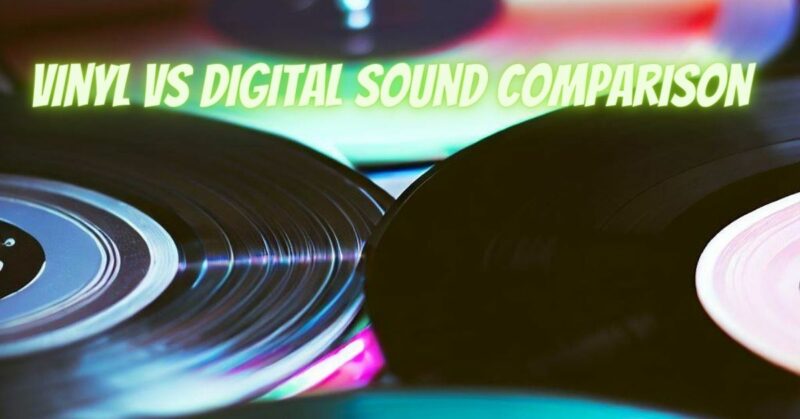Vinyl records and digital audio have been the two main formats for listening to music for decades. Both have their own advantages and disadvantages, and the debate over which one sounds better has been raging for years.
In this article, we’ll take a closer look at vinyl and digital sound, and we’ll compare the two formats in terms of sound quality, price, and convenience. We’ll also provide a table that summarizes the key differences between vinyl and digital sound.
Vinyl Sound
Vinyl records are analog recordings, which means that the sound waves are stored as physical grooves on the record. When the record is played, a needle in the record player’s cartridge vibrates as it follows the grooves, and these vibrations are converted into electrical signals that are then amplified and played through speakers.
Vinyl records are often said to have a warmer, more natural sound than digital audio. This is because the analog signal is continuous, whereas the digital signal is sampled and then converted into a series of numbers. This can result in a more jagged sound with digital audio, which some people find to be less appealing.
Digital Sound
Digital audio is stored as a series of numbers, which represent the amplitude and frequency of the sound waves. These numbers are then stored on a computer or other digital device. When the digital audio is played, the numbers are converted back into sound waves and then amplified and played through speakers.
Digital audio has a number of advantages over vinyl records. It is more durable, it can be stored in a smaller space, and it can be easily copied and shared. Digital audio also has a higher potential sound quality than vinyl records, as it is not limited by the physical limitations of the vinyl record.
Comparison Table
Here is a table that summarizes the key differences between vinyl and digital sound:
| Feature | Vinyl | Digital |
|---|---|---|
| Analog or digital | Analog | Digital |
| Sound quality | Warmer, more natural | More accurate, higher potential sound quality |
| Durability | Less durable | More durable |
| Storage space | Takes up more space | Takes up less space |
| Ease of copying and sharing | More difficult | Easier |
Conclusion
So, which format sounds better? The answer is a matter of personal preference. Some people prefer the warmer, more natural sound of vinyl records, while others prefer the higher potential sound quality of digital audio. Ultimately, the best way to decide which format is right for you is to listen to both and see which one you prefer.
Additional Information
Here are some additional information about vinyl and digital sound:
- Vinyl noise. Vinyl records can produce a certain amount of noise, such as pops and clicks. This is due to the physical nature of the vinyl record and the needle in the record player’s cartridge.
- Digital noise. Digital audio can also produce a certain amount of noise, but it is typically much less than vinyl noise. This is because digital audio is stored as a series of numbers, which can be easily filtered to remove noise.
- Vinyl care. Vinyl records need to be cared for properly in order to prevent them from getting damaged. This means keeping them clean and free of dust, and storing them in a cool, dry place.
- Digital storage. Digital audio can be stored on a variety of devices, such as computers, hard drives, and CDs. This makes it easy to back up your music and to share it with others.
I hope this article has been helpful. If you have any further questions, please feel free to ask.


